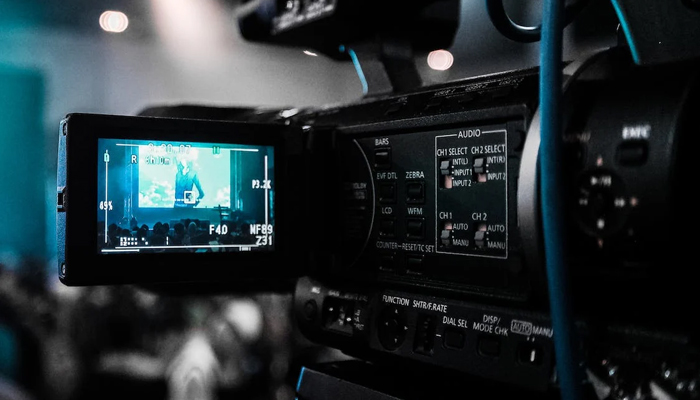Debate on evolution of film, cinema culture held
During talk Iqbal Qaiser also launched his latest book entitled “film tay Lahore”, first Punjabi book on history of Pakistan film
LAHORE: THAAP hosted another thought-provoking talk on journey of film here on Saturday.
Punjabi activist & researcher Iqbal Qaiser, who has passed years in collecting information about the journey of film in Pakistan, presented his research findings. The talk highlighted fascinating insights into the evolution of the city's cinematic landscape post-partition.
Iqbal Qaiser also screened a delightful short documentary featuring the well researched information about establishment of film roots in Pakistan, production of first Urdu film Teri Yaad, Industry’s decade wise progression, Urdu and Punjabi language conflict, introduction of progressive ideas and influence of Indian film, impact of marital law etc.
During the talk Iqbal Qaiser also launched his latest book entitled “film tay Lahore”, the first Punjabi book on the history of Pakistan film. The book offered a captivating journey through the evolution of Lahore's cinematic landscape, highlighting its enduring legacy and cultural resonance.
The book provides a comprehensive overview of Lahore's film production studios and the leading personalities who played instrumental roles in establishing foundations of the city's film industry. AR Kardar, known as the pioneer filmmaker, is celebrated for his groundbreaking contributions to Pakistani cinema. M Ismael, Master Ghulam Qadir, and Krishan Laal Mehta are recognised for their respective roles as character artist, fight masters, and studio owners, each contributing to the flourishing of Lahore's film scene. These four persons bowed the seeds of film industry in Pakistan, which later transformed into a big tree and produced many legend artists, evergreen films and music which is still cherished worldwide.
Iqbal Qaiser paid tribute to iconic figures like Madam Noor Jahan, recognising their immense contributions to Pakistani cinema through their exceptional talents and performances. He divided the history of film in five decades 1947 to 1997 onwards and shed light on highlights of each film decade, prominent films and actors, prominent encounters such as Jaal movements, Urdu/Punjabi Language conflict, introduction of cassette and VCR , impact of marital law on film industry etc.
The talk was supported by visually engaging slides featuring film posters, memorable dialogues, and iconic songs, enhancing the audience's understanding and immersion in Lahore's cinematic history.
Iqbal Qaiser hinted that today cinema in Pakistan is struggling because it is no more, mean of entertainment for general public. Large part of population cannot afford to watch the film in multiplex cinemas with their families because of increased prices of tickets etc. Leading personalities from different walks of life attended the talk and shared their memories of film and cinema culture in Pakistan in question answer session.
Prof (retd) Pervaiz Vandal highlighted the challenges facing Punjabi cinema in Pakistan, emphasising the need to protect the Punjabi language as a vital component of the film industry's identity and cultural heritage.
He suggested that a comprehensive plan to safeguard the Punjabi language would not only preserve linguistic diversity but also ensure the resilience and authenticity of Punjabi cinema against external influences.
-
 'Euphoria' Star Eric Made Deliberate Decision To Go Public With His ALS Diagnosis: 'Life Isn't About Me Anymore'
'Euphoria' Star Eric Made Deliberate Decision To Go Public With His ALS Diagnosis: 'Life Isn't About Me Anymore' -
 Toy Story 5 Trailer Out: Woody And Buzz Faces Digital Age
Toy Story 5 Trailer Out: Woody And Buzz Faces Digital Age -
 Andrew’s Predicament Grows As Royal Lodge Lands In The Middle Of The Epstein Investigation
Andrew’s Predicament Grows As Royal Lodge Lands In The Middle Of The Epstein Investigation -
 Rebecca Gayheart Unveils What Actually Happened When Ex-husband Eric Dane Called Her To Reveal His ALS Diagnosis
Rebecca Gayheart Unveils What Actually Happened When Ex-husband Eric Dane Called Her To Reveal His ALS Diagnosis -
 What We Know About Chris Cornell's Final Hours
What We Know About Chris Cornell's Final Hours -
 Scientists Uncover Surprising Link Between 2.7 Million-year-old Climate Tipping Point & Human Evolution
Scientists Uncover Surprising Link Between 2.7 Million-year-old Climate Tipping Point & Human Evolution -
 NASA Takes Next Step Towards Moon Mission As Artemis II Moves To Launch Pad Operations Following Successful Fuel Test
NASA Takes Next Step Towards Moon Mission As Artemis II Moves To Launch Pad Operations Following Successful Fuel Test -
 GTA 6 Price Leaked Online Ahead Of Rockstar Announcement
GTA 6 Price Leaked Online Ahead Of Rockstar Announcement -
 Eric Dane Got Honest About His Struggle With ALS In Final Public Appearance: 'No Reason To Be In A Good Spirit'
Eric Dane Got Honest About His Struggle With ALS In Final Public Appearance: 'No Reason To Be In A Good Spirit' -
 Google AI Overviews And Mental Health: Why Experts Say It’s ‘very Dangerous’
Google AI Overviews And Mental Health: Why Experts Say It’s ‘very Dangerous’ -
 Prince Harry Issues A Statement For His 'incredible' WellChild Children
Prince Harry Issues A Statement For His 'incredible' WellChild Children -
 5 Famous Celebrities Who Beat Cancer
5 Famous Celebrities Who Beat Cancer -
 Spinosaurus Mirabilis: New Species Ready To Take Center Stage At Chicago Children’s Museum In Surprising Discovery
Spinosaurus Mirabilis: New Species Ready To Take Center Stage At Chicago Children’s Museum In Surprising Discovery -
 ByteDance Expands Artificial Intelligence Operations In US
ByteDance Expands Artificial Intelligence Operations In US -
 Angelina Jolie’s Breast Cancer Surgeon Appreciates Her For Calling Scars 'a Choice': 'They Are Choices To Survive'
Angelina Jolie’s Breast Cancer Surgeon Appreciates Her For Calling Scars 'a Choice': 'They Are Choices To Survive' -
 Detective Chief Inspector Reveals How Andrew Got Treated In Police Custody
Detective Chief Inspector Reveals How Andrew Got Treated In Police Custody




